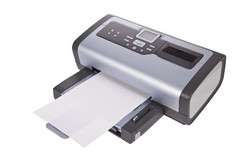Researchers develop printable plastic transistor capable of identifying what type of illness you're suffering from

From houses and chocolate to robots and ball gowns – there seems to be no end to the possibilities of 3-D printing. However, don't throw out your clunky inkjet printer just yet – it may one day be able to help you diagnose your illness!
Researchers at the Catalan Institution for Research and Advanced Studies (ICREA) and the Leibniz Institute for Solid State and Materials Research in Dresden and have engineered printable plastic transistors that can detect pathogens in blood or saliva. In the future, they may be capable of identifying what type of illness you're suffering from.
The transistor recognises the protein biomarkers of common diseases, switching on only when it has detected them. New Scientist reports that it can be printed with an inkjet printer using a special ink embedded with a common antibody called human immunoglobulin G: 'This antibody binds to antigens from a number of common viruses, bacteria and fungi. When a disease protein binds to an antibody, it changes the transistor's electrical properties, altering the voltage level at which it turns on.' The team tells New Scientist that eventually doctors could print out a sheet of the devices – each equipped with a different disease antigen –and diagnose people almost instantly.
A key aspect of the research, as noted by the Catalan Institute for Nanoscience and Nanotechnology (ICN), is that the scientists explored an interesting alternative to inorganic TFTs (silicon) with organic TFTs (OTFTs). These offer the possibility of mass production by using the conventional printing technology and work with low-cost materials.
Tony Turner, head of the biosensors and bioelectronics centre at Linköping University in Sweden tells New Scientists that he is impressed with the proof of concept but points to potential obstacles. 'It combines the sophistication of advanced electrochemical biosensors with a simple manufacturing technique,' he says. 'Interference due to pH changes in real samples might be a problem for them, but overall, mobile diagnostics for healthcare, food safety and environmental monitoring demands such new generations of inexpensive sensing systems.'
ICN also notes that numerous inherent problems still remain, especially concerning the long-term stability and lack of reliability.
More information: For further information, please visit: onlinelibrary.wiley.com/doi/10 … m.201401180/abstract
Provided by CORDIS





















